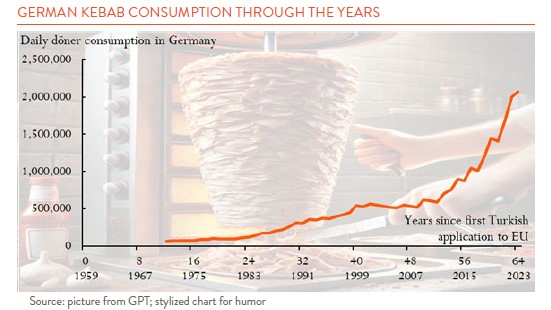Every country has culinary specialties influenced by other places as food cultures eventually meld together. Rarely does it become political.
In the U.S., we’ve got hamburgers (who knows where they came from). In the U.K., it’s curries and chicken tikka masala. In the Netherlands, they have rijsttafel (inspired by the Indonesian “rice table”). In Germany, it’s the döner kebab.
For the uninitiated, döner is a sandwich made from shaved meat, cooked as it turns on a vertical stake. It is very popular, more so than any kind of bratwurst, and kebab shops have become a pervasive feature of German cities and towns. That makes it very, German, right?
The origins of the sandwich in Germany have been traced back to 1970s Berlin, created by members of the large Turkish community that settled there. But döner kebab clearly has Turkish origins. “Döner” comes from the Turkish verb “to turn” and “kebab” is the word for “roasted meat.” Germans say the fare is theirs, while the Turks correct their pronunciation.

Turkey recently took it a step further and applied to register “döner” under the EU’s “traditional specialty guaranteed” (TSG) designation (think: Italy’s mozzarella tradizionale or Spain’s serrano ham). Turkey’s application claimed döner dates to the 1800s and the cooking method to 1546. TSG would be a big deal as it carries with it costly bureaucratic requirements and exclusive use of the döner name only for products that conform to official specifications.
Germany has since appealed. Now the sandwich is a political hot potato. “The döner belongs in Germany. There is no need for any guidelines from Ankara,” said German Agriculture Minister Cem Ozemir, whose parents, by the way, immigrated from Turkey.
And while Germany has been happy to claim the food, it has been less eager to take on political affiliations with Turkey. Turkey has had perhaps the longest accession process to the EU (and its predecessor unions), which began in 1959 with application to the European Economic Community. Since then, negotiations have stalled and restarted. Official membership talks with the EU began in 2005. Since 2016, they have been frozen after EU officials voiced concerns over President Erdogan’s response to a coup. In 2019, talks were officially suspended as the EU felt Turkey had been moving further away from Europe, “backsliding on the rule of law and on fundamental rights.”
Throughout the decades of accession history, Germany has often been an outspoken (and sometimes furtive) fly in the ointment. Fueled by their döner kebabs at lunch, officials return to their chambers to oppose Turkish accession. Now that the lunchtime favorite has become the political story, who knows how this döner diplomacy will play out? One thing is clear: our palates often agree where our politics do not.